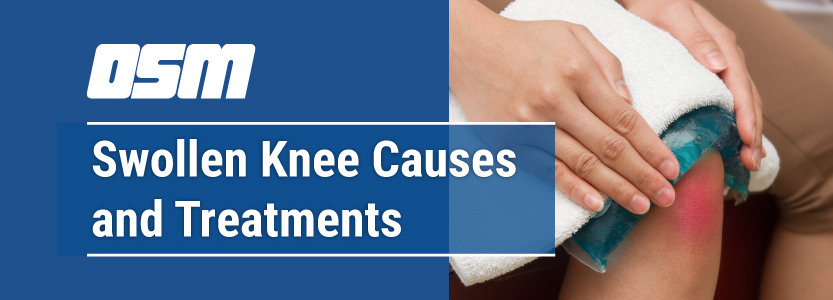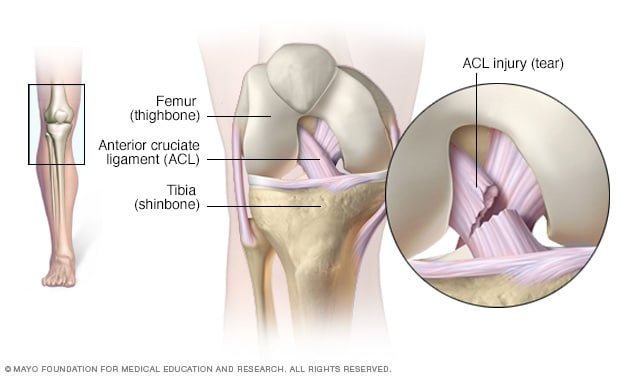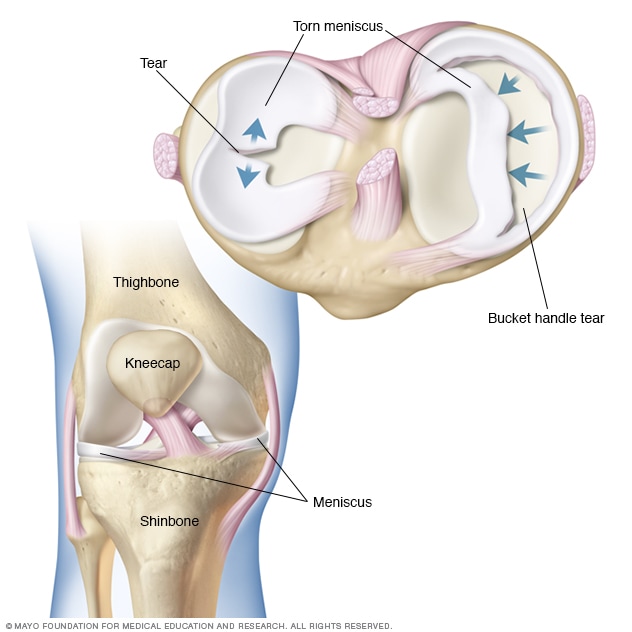Swollen Knee Causes and Treatments
Article featured on the Mayo Clinic
Overview
A swollen knee occurs when excess fluid accumulates in or around your knee joint. Your doctor might refer to this condition as an effusion (ih-FYU-zhen) in your knee joint. Some people call this condition “water on the knee.”
A swollen knee may be the result of trauma, overuse injuries, or an underlying disease or condition. To determine the cause of the swelling, your doctor might need to obtain a sample of the fluid to test for infection, disease or injury.
Removing some of the fluid also helps reduce the pain and stiffness associated with the swelling. Once your doctor determines the underlying cause of your swollen knee, appropriate treatment can begin.
Symptoms
Signs and symptoms typically include:
- Swelling. The skin around your kneecap can puff up noticeably, especially when you compare the affected knee to the normal one.
- Stiffness. When your knee joint contains excess fluid, you might not be able to bend or straighten your leg completely.
- Pain. Depending on the cause of the fluid buildup, the knee might be very painful — to the point that it’s difficult or impossible to bear weight on it.
When to see a doctor
See your doctor if:
- Self-care measures or prescribed medications don’t relieve the pain and swelling
- One knee becomes red and feels warm to the touch compared to your other knee
Causes
Many types of problems, ranging from traumatic injuries to diseases and other conditions, can cause a swollen knee.
Injuries
Damage to any part of your knee can cause excess joint fluid to accumulate. Injuries that can cause fluid buildup in and around the knee joint include:
- Torn ligament, particularly the anterior cruciate ligament (ACL)
- Cartilage (meniscus) tear
- Irritation from overuse
- Broken bones
Diseases and conditions
Underlying diseases and conditions that can produce fluid buildup in and around the knee joint include:
- Osteoarthritis
- Rheumatoid arthritis
- Infection
- Gout
- Pseudogout
- Bursitis
- Cysts
- Tumors
Risk factors
- Age. Your likelihood of developing a swollen knee related to arthritis increases as you age.
- Sports. People who participate in sports that involve twisting the knee, such as basketball, are more likely to experience the types of knee injuries that cause swelling.
- Obesity. Excess weight puts added stress on the knee joint, contributing to the tissue and joint overload and knee degeneration that can lead to a swollen knee. Obesity increases your risk of osteoarthritis, one of the more frequent causes of knee swelling.
Complications
Complications of a swollen knee can include:
- Muscle loss. Fluid in the knee can harm the working of your muscles and cause thigh muscles to weaken and atrophy.
- Fluid-filled sac (Baker’s cyst). The buildup of fluid in your knee can lead to the formation of a Baker’s cyst in the back of your knee. A swollen Baker’s cyst can be painful, but usually improves with icing and compression. If the swelling is severe, you might need to have fluid removed (cyst aspiration).
Prevention
A swollen knee is typically the result of an injury or chronic health condition. To manage your overall health and prevent injuries:
- Strengthen the muscles around your knee. Strong muscles around a joint can help ease pressure on the joint itself.
- Choose low-impact exercise. Certain activities, such as water aerobics and swimming, don’t place continuous weight-bearing stress on your knee joints.
- Maintain a healthy weight. Excess weight contributes to the wear-and-tear damage that can lead to a swollen knee.
The Orthopedic & Sports Medicine Center of Oregon is an award-winning, board-certified orthopedic group located in downtown Portland Oregon. We utilize both surgical and nonsurgical means to treat musculoskeletal trauma, spine diseases, sports injuries, degenerative diseases, infections, tumors and congenital disorders.
Our mission is to return our patients back to pain-free mobility and full strength as quickly and painlessly as possible using both surgical and non-surgical orthopedic procedures.
Our expert physicians provide leading-edge, comprehensive care in the diagnosis and treatment of orthopedic conditions, including total joint replacement and sports medicine. We apply the latest state-of-the-art techniques in order to return our patients to their active lifestyle.
If you’re looking for compassionate, expert orthopedic surgeons in Portland Oregon, contact OSM today.
Phone:
503-224-8399
Address
17355 Lower Boones Ferry Rd Suite 100A
Lake Oswego, OR 97035
Hours
Monday–Friday
8:00am – 4:30pm





